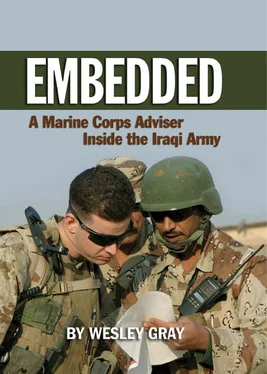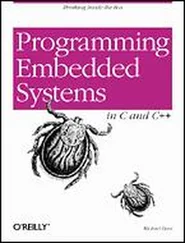Hasen lectured me on Iraq’s past. “Lieutenant Gray, I sat for three years in my home during the American invasion. I was ashamed we had lost to American forces. Do you know how humiliating this was for those of us in the old Iraqi army? It took me three years to overcome my disappointment.” He continued in a solemn voice. “I had eleven years in the former Iraqi army, I had a bright future ahead of me, and in one instant the Americans destroyed my future by telling me I was banished from the Iraqi army. When they asked me to come back to the army, I wasn’t sure I had the will to restart from the ground up. Eleven years of my life—wasted.”
Captain Hasen elaborated on his past positions with pride. During his service as an SPG-9 antiaircraft gun company commander, his unit destroyed American planes and tanks during the initial phases of OIF and the first Gulf War. I listened to Hasen’s stories of leadership and success on the battlefield, knowing his successes were our American losses. Hasen understood I had respect for him as a fellow warrior. It was fortunate our interests were aligned this time around.
Captain Hasen is a great man. I am certain he has his Iraqi quirks and oddities that seem selfish and ridiculous through an American lens, but there is something genuine about him. With men like him, perhaps there is hope for Iraqis to create a prosperous Iraq.
After speaking with Hasen I returned to my hooch. I quickly realized it was the first anniversary of my wedding and I had no way to contact my wife. The Iridium phones were out of batteries that day. Of course, my wife had come to expect this from the Marine Corps. The day after we got married we didn’t go on a honeymoon; instead, we moved all my stuff down to Dam Neck, Virginia, so I could attend Ground Officer’s Intelligence School. It wasn’t exactly a romantic escapade. Sadly, our first anniversary wasn’t romantic, either. C’est la vie.
Chapter 7
Jamal in the Swahuts
August 2006
The jundi loved my “top-secret weapon.” I want to reveal it here so that future ambassadors to the Arab world can take advantage of my technique. In reality my top-secret weapon was neither secret nor a weapon. It was a family photo album I stuffed in my cargo pocket.
During predeployment I put in a lot of time learning about Arab culture. One thing I took away from my studies was that family is central in Arab life. In the Arab mind anyone who keeps God and his family as the highest priority in his life cannot be a bad man. I knew the Arabs perceived Americans as Godless heathens, more concerned with material wealth than family. To combat this stereotype I created a family photo album that I could show the Iraqis.
In my top-secret weapon I included photos of me working with the sheep on our ranch, my family baling hay on the farm, and photos of us hanging out at our cabin in the mountains. I was quick to throw out pictures of me raising pigs, hugging our dogs, and my wedding at a fabulous mansion (rented for the occasion) in Pennsylvania. Those, I knew, would not go over well in Iraqi culture.
This worked much better than I expected. It allowed me to cut through all the perceptions Iraqis had of Americans, and I was one step closer to being inside the Iraqi army. The jundi loved seeing pictures of my family and of me doing things similar to things they did. Coupling my top-secret weapon with my growing ability to speak Arabic, I felt I was forming quality relationships with the jundi .
One night, armed with my album, I made my nightly visit to the jundi hooches (living area) to learn some language and learn about Iraq. I sat down with an Iraqi named Sermen. He was Sunni, his mother was Shia, and his grandmother was Catholic—go figure.
Sermen had an almost frightening amount of knowledge of the insurgency. He claimed he got his information from his friends who were insurgents, but I was not convinced. According to Sermen the going rate for firing an RPG at Americans was five hundred dollars, the going rate for emplacing IEDs was three hundred dollars, and for actually killing an American you received a thousand bucks. Sermen described a sniper in Baghdad who had killed over a hundred troops from the coalition forces. Apparently this insurgent had a garage full of BMWs and stacks of cash. It sounded like being an insurgent made economic sense.
The jundi in our battalion made roughly $350 a month. The highest paid Iraqi in our battalion was Colonel Abass, who cleared about $900 a month. Put simply, being a jundi was bad business. The alternative to serving in the Iraqi army was to commit one insurgent attack per month (make five hundred dollars for an IED) and watch television for the other twenty-nine days of the month.
After chatting with Sermen I passed by the scout’s swahut on my way back to the MiTT camp. Kareem greeted me. “Lieutenant,” he said, “take a seat, stay a while, drink some tea, let’s talk about your family.” One of the Iraqis, Ali, asked for my name in broken English. I replied in Arabic with a wide smile, “Ismee Mulazim Gray, sadeeki” (My name is Lieutenant Gray, my friend). The Iraqis repeated together, “Mulazim Gay?” I looked at them and said, “La [no], Mulazim Guurray.” The Iraqis tried again. “Mulazim Gaaay?”
I knew that I could not have the Iraqis calling me “Lieutenant Gay” or it would be a never-ending joke with the Marines for the remainder of my deployment. I needed to rectify the situation. I struggled with the Iraqis to help them pronounce my name correctly. Luckily, Ali came up with a better solution. “Let’s give him an Arabic name,” he said. The swahut erupted with applause. The scouts thought this was the greatest idea since the Arabic numeral system. Everyone started shouting suggestions. Ali said, “Mohammed or Khalis?” Another fired, “No, I like Jaffer, or Ali.” Kareem butted in. “No way. Let’s call him Riath or Rasheed.” Finally, Hyder, the most respected scout, proclaimed, “Inta warda, inta tkoon Jamal, Mulazim Jamal!” (You are a flower, you will be Jamal, Lieutenant Jamal!) Before I could even respond and tell the Iraqis that I thought being called a “flower” in a room full of twenty Iraqi soldiers was awkward, it had already caught on. The swahut shouted in unison, “Mulazim Jamal, Mulazim Jamal, Mulazim Jamal.” Oh well, I thought, Mulazim Jamal it is.
The History of Iraq… and Everyone’s Desire to Take Their Oil
It seemed that every day I went to the Iraqi swahut area I learned something about Iraqis. One day the terps gave me lessons on the history of Iraq and how Iraqis perceive altruistic people. I cracked the door on the terp swahut and was promptly greeted by Martin. “Is that Mulazim Jamal at the door?” he asked. Somehow word had already traveled throughout the camp that the Iraqis had named me Jamal.
Martin invited me in and gave me his “history of Iraq that Americans need to understand” lecture. With a title like that, I was all ears. Martin mentioned how Americans, Brits, Turks, and the Persians have all come into his country with the thought they would pacify the people. Their basic strategies have been similar: kill everyone who resists in the beginning, see where the dust settles, and then rely on selected Iraqi leaders to show initiative and tie the society together in a peaceful society where people let bygones be bygones and everyone respects the rule of law. But, he said, that does not apply to Iraq. In two thousand years of documented history, there had been a few constants: tribal infighting, sectarian violence, and war with outsiders.
Martin continued. “Jamal, two people have controlled Iraq in our history. One was our good friend Saddam Hussein, and the other was a man named Al Hajaj, who ruled Iraq over a thousand years ago. They controlled Iraq because they had key characteristics that Americans and outsiders need to understand. Saddam and Al Hajaj were brutal tyrants who ruled with fists of steel and hammers of iron to crush all those who wanted to oppose them.”
Читать дальше












